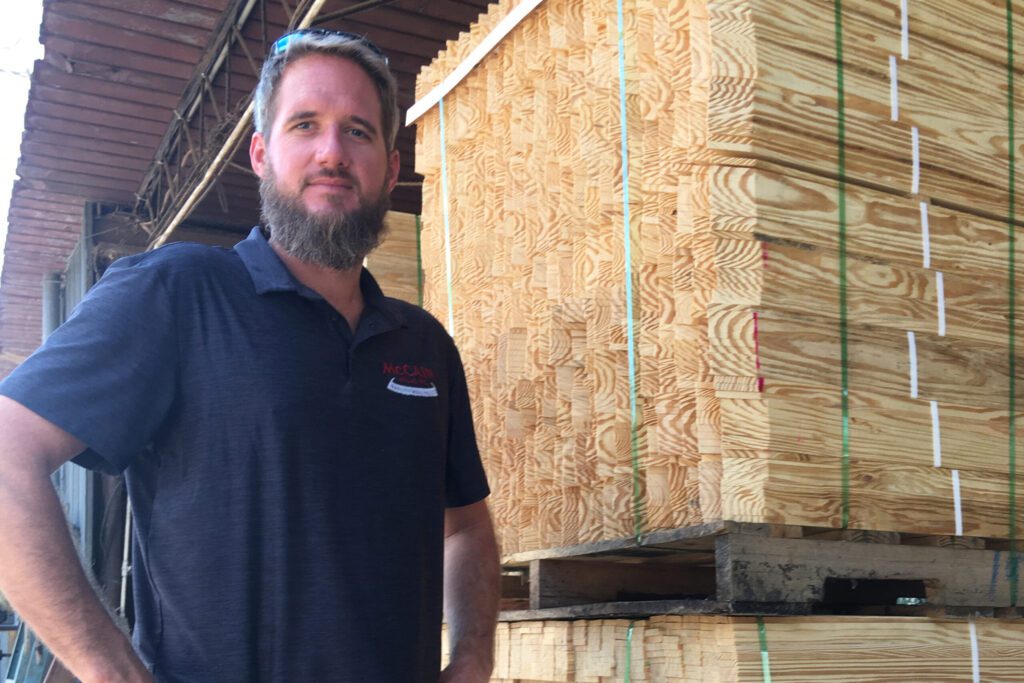Plant City Saw Mill Has Been Supporting Local Families for 50 Years
by PAUL CATALA
When R.J. Stone opened a sawmill in Plant City about 50 years ago, he spent the first 30 years focusing on wood products for agriculture – 2-by-2-feet posts for peppers and 5-feet tall stakes for tomatoes, for example.
McCain Mills is a locally owned and operated sawmill about six miles north of downtown Plant City. When it first opened, Plant City’s population was just 15,450 residents. Today, it’s nearing 40,000 and what was once mostly farmland and cattle ranches is now giving way to walled subdivisions and shopping centers.
That growth has changed McCain Mills’ production focus to about 70 percent serving development and 30 percent serving agriculture. But no matter what’s in production, business is moving along at the mill at 5605 Paul Buchman Hwy.
From “Southern Stake” to “Iva’s Stake Mill” to “Herndon Mills” and now “McCain Mills,” the company has always supported local families.
Initially, most of its production was milling freshly logged local cypress into smaller logs and into pepper and tomato stakes for farming. Mill operators also cut native Florida pine into lumber, flooring, board and batten siding.
Currently, McCain Mills and its seven full-time employees mostly cut and produce survey-grade stakes, rough-cut lumber, custom cuttings and wood for lobster traps.
In December 2018, Josh McCain bought the mill and surrounding eight acres. He spent about five years working part-time at the mill doing mechanical maintenance. By the beginning of January 2019, after securing some loans, the 32-year-old Lakeland native had his own sawmill.
“It got to the point I was ready for a change. (Jay Herndon) was ready to retire and I was in the position to buy,” says McCain, a Lakeland native who graduated from Lakeland High School in 2006. “The biggest appeal was being able to work for myself. and I enjoy big projects. This is a smaller scale, but I’m running my own show.”
McCain says his company still specializes in smaller-scale, custom-cut lumber for customers with timber sourced from their own land.
“Custom cut lumber will never go away. As time progressed, the mill started to focus on bigger and better production to support development. Higher quantities with better efficiency became the goal,” adds McCain, who lives in Lakeland with his wife, Tenille and son Breckin, 14 and daughter, Westyn, 7.
“Land surveyors, civil engineering firms, excavation contractors began looking for high quality wood stakes for projects. Today, McCain Mills sends construction stakes all over the state of Florida supporting the rapid development, while still supporting local homeowners and carpenters with their custom lumber projects.”
These days at McCain Mills, where McCain has added about 5,000 square feet for wood storage, he and his employees are processing about 23,000 board feet per week. However, the ongoing coronavirus pandemic has been causing price increases. In September, southern yellow pine prices reached what he says is a “staggering” 137 percent increase since January.
According to statistics from Forest2Market, a forest industry analysis company, weighted lumber prices increased 140 percent in two weeks by the first week of August. McCain says he hopes to slide prices down once the market rebounds.
“The pandemic has created an inventory and supply chain issue which has driven up prices on all dimensional lumber and engineered wood products across the country,” says McCain, who attended Traviss Technical College and Polk State College.
“I was fortunate to have about 18 weeks of raw material purchased at the beginning of this year. All of our inventory has since been used and wood futures look to remain high through the end of the year at least.”
One of the goals McCain has for his saw mill and staff is to get more involved in exotic live edge slabs, exotic wood products culled domestically and imported. The wood is used for high-end tables, desks, countertops, kitchen islands, dining tables and other furniture. The wood slabs include parotta, monkey pod, American walnut and yellow dante.
McCain says the mill is stable and will remain viable into the foreseeable future and is happy with current performance and production.
“Property-wise, we’re set up where we need to be and as far as production and demand, we’re right where we need to be; it’s all good.”

